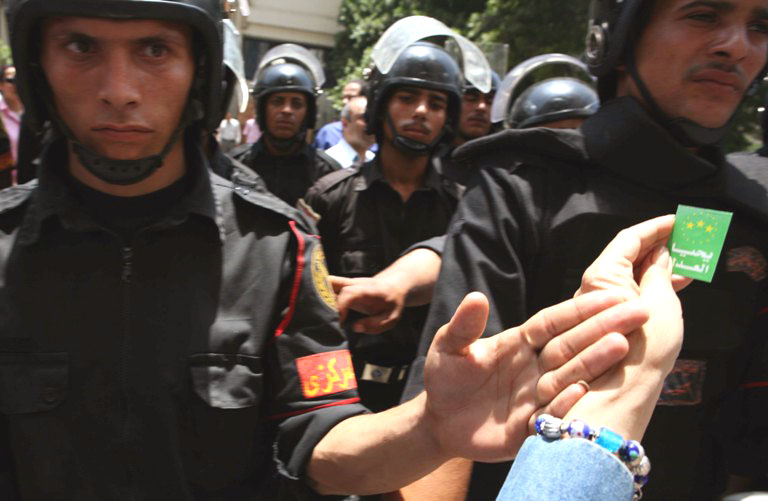Egypt: We Are Watching You
Three Egyptian Women Use the Internet to Promote Democracy
Shayfeen.com
The documentary follows Shayfeen during the first year of the project. The trio monitored elections by sending dozens of people to polling places to ensure that the process was regular and democratic, particularly at so-called "trouble spots." Volunteers videotaped polling irregularities, interviewed people about their experiences and then posted the footage and photographs on the Web site for all of Egypt and the world to see.
Watching the Watchers
Directors Elkatsha and Noujaim filmed alongside the Shayfeen "watchers" as they conducted interviews. On camera, people speak about being tortured for protesting against irregularities. We hear from judges unable to make independent decisions. In one of the most poignant scenes in the film, an older Egyptian man, exasperated by the government-sponsored election fraud, approaches the camera, looks straight into it and cries out: "Record this!" He explains that when his wife tried to vote, she brought her voting ballot to a judge who looked at her and told her, straight-faced, that she could not vote twice. She pointed to her empty ballot, but the judge shooed her away, telling her to "Take your complaint to the president."
In Elkatsha and Noujaim's hands, this scene, which could seem hopeless, becomes the opposite. The outraged man, determined to have his wife's story of injustice heard and recorded, is presented as proof that the pillars of Egyptian democracy have been put in place, that its citizens are aware of their rights and not afraid to demand them.
Defying Stereotypes
As much as the film is about Shayfeen's mission, it is also about the women, themselves. "When we were introduced to Engi, Ghada, and Bosayna, we knew this was our film," says Elkatsha. "I grew up with outspoken, powerful women, andEgypt: We Are Watching You was our chance to put three such women on the screen. We were drawn by their characters, and the way they complemented one another even though the work they were doing in support of democratic initiatives was taking them in different directions. They were tireless in their efforts, and we found this very inspiring."
Elkatsha continues, "In today's media culture, it is important to show three strong, independent women from the Middle East, who defy stereotypes."
These Middle Eastern women smoke. They are not veiled. They are educated. They are activists. They are tech savvy. They wear designer clothing. They speak their minds. They get angry. They cry. They have a sense of humor. They are patriotic. In the context of most Western representations of Middle Eastern women, every shot of Haddad taking a drag on her cigarette feels like a breath of fresh air.
Blue Skies and a Beautiful Country
One way the film celebrates the women is through its strategic use of color. Haddad wears a bright red shirt while behind her a green curtain flutters in the breeze. Looking like a Hollywood starlet, Kamel is framed by flickering orange lights. Shahbandar speaks against a rich red backdrop that brings out the light blue in her eyes.
The directors' emphasis on color is not coincidental, but inspired by Haddad's description of her ideal Egypt. Before her disillusionment with the status quo, Haddad produced a campaign video for President Mubarak's National Democratic Party in which she created a prototype of that "perfect" Egypt.
In it, she says, the skies are "clear blue, the greens are really green and the peasant is wearing this beautiful dress." Haddad is now critical of her one-time idealism. "I thought that all it took was some color correction, some blue skies and we would have this beautiful country."
Directors Elkatsha and Noujaim borrow Haddad's theme of color as symbolic of a democratic Egypt. But they are definitely not "color correcting" Egyptian democracy. Rather, they are showing that bright, colorful Egyptians are coming together to correct it themselves by fighting to make that ideal, picture-perfect Egypt a reality. "Nobody can make this Egypt happen except the Egyptians," says Haddad.
At the end of the film, Boysana sums up Shayfeen's mission: "Change won't come suddenly. It'll come step by step. Our first step was to open our eyes."
ITVS funded this film as part of their Global Perspectives Collection. For educator resources on this story on Shafyeen.com, visit ITVS.
Other educator resources are also available.


